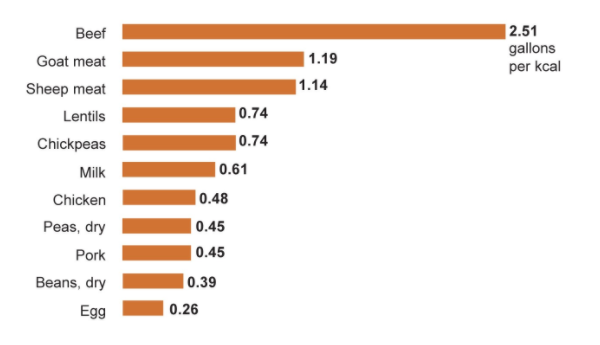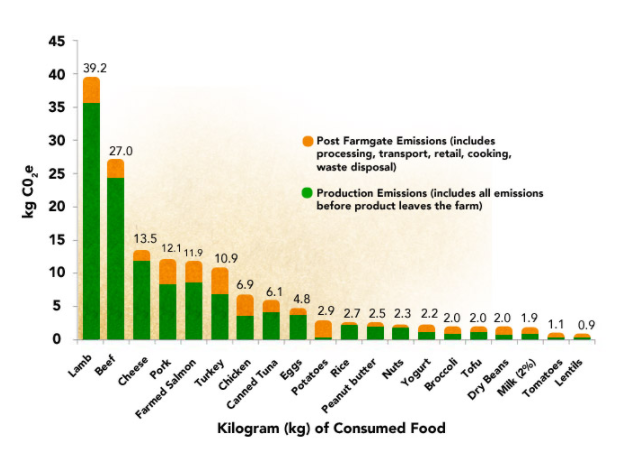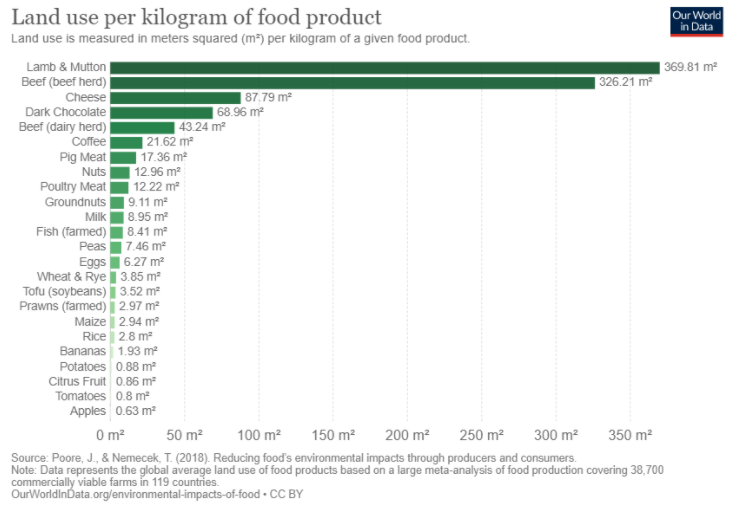The Environmental Impacts of Different Diets
Photo: fooducate.com
By: Lauren Kleve, Intern
Have you ever considered the environmental impact of your food? The kind of food you eat, the source of that food, and the farming practices of that food all significantly affect your ecological footprint! Your ecological footprint is the amount of natural resources from the Earth (land, water, energy, etc.) you rely on to sustain your lifestyle. The smaller your footprint, the less harm you are causing to the environment. Hopefully you want to reduce your ecological footprint, and one easy way to do so is to change your eating habits!
There are many different ways to eat a more environmentally friendly diet! First, I will inform you on the environmental harms of concentrated animal agriculture (concentrated animal agriculture is a specific type of large-scale industrial agricultural that raises animals, typically at high-density, for the consumption of meat, eggs, or milk), and then I will walk you through some eco-conscious diet and food options and their benefits. This will allow you to decide what is the best option and what makes the most sense for yourself!
The Environmental Harms of Animal Agriculture
- According to the United Nations’ 2006 report, raising animals for food generates more greenhouse gases than all the cars and trucks in the world combined.
- Cows and sheep are responsible for 37% of the total methane generated by human activity. Methane emissions are responsible for nearly half of the planet’s human-induced warming.
- The livestock industry generates 64% of ammonia, which contributes significantly to acid rain.
- The livestock industry also generates 65% of human-realeed nitrous oxide, which has 300 times the Global Warming Potential of CO2; most of this comes from manure.
- Pollution of our waterways is caused by animal waste, antibiotics and hormones entering the water cycle alongside chemicals from tanneries, fertilizers, and the pesticides used to spray feed crops.
- Farmed animals produce about 130 times as much excrement as the entire human population of the United States. Factory farms don't have sewage treatment systems like our cities and towns do, this concentrated slop ends up polluting our water, destroying our topsoil, and contaminating our air.
- Livestock farming can lead to overgrazing causing soil erosion, desertification and deforestation. Twenty percent of the world’s grazing land has already been designated as degraded due to the rearing of animals for their meat.
- Livestock production is responsible for 70% of deforestation in the Amazon region of Latin America, where rainforests are being cleared to create new pastures.
Different Environmentally-Conscious Diets
Many of the common animal-based foods we eat are not sustainable for the Earth, but luckily there are many different diets to help reduce our negative impact on the planet. Here are some of the more established eco-conscious diets:
- Vegan: A vegan diet means you eat a completely plant based diet, a.k.a no consuming foods that come from an animal.
- Vegetarian: A vegetarian diet means you don’t eat any meat but still eat other animal products, like dairy.
- Flexitarian: A flexitarian is someone who tries to eat a vegetarian diet or mostly plant-based foods, but they are flexible. They are trying to significantly reduce their meat and animal-based product consumption, but not completely. The definition can be interpreted however each individual wants it to be!
- Freegan: A freegan is a person who won’t financially support the production of animal products, but will eat non-vegan foods that would otherwise end up as garbage. This type of person usually supports living a low-waste lifestyle and/or doesn’t want to see things go to waste.
- Eating Local: If you don’t want to limit yourself to any kind of diet but still want to help the planet, consider supporting local farms and eating locally produced food! This is a great option for meat lovers because they can still eat meat, but contribute to significantly less CO2 emissions and overall better farming practices!
- Supporting Regenerative Agriculture: Regenerative Agriculture is a farming and grazing practice that has many benefits! It helps reverse climate change by rebuilding organic soil matter and restoring degraded soil biodiversity, which results in reduced carbon emissions and improves the water cycle.
The Environmental Impacts of Specific Foods
As mentioned in an earlier section, animal agriculture can be detrimental to the environment, however, I understand for some people giving up animal-based products is not an option for them. These charts show the water usage, land usage, and carbon emissions of various food products in order to help you understand the environmental impact of specific foods. This can help you create your own individualized diet of the foods you want, while still lowering your ecological footprint!
(Chart from Gemperle Family Farms of the water usage per gallon of various food products)
(Chart from Gemperle Family Farms representing CO2 emissions per kg of various food products)
(Chart from Our World in Data representing land use per kg of various food products)
The Environmental Benefits of Eco-Conscious Diets
- According to The Vegan Calculator, every day a person eating a vegan diet saves 20 pounds of CO2 emissions, 30 square feet of forest, 40 pounds of grain, and 1,100 pounds of water!
Eating a vegetarian diet reduces your carbon emissions by 2.5 times compared to a meat diet.
- A vegetarian diet requires 2.5 times less the amount of land needed to grow food, compared to a meat-based diet.
- In the USA, up to 40% of food ends up in landfills, and a freegan diet helps reduce that number!
- Conventional food distribution was responsible for 5 to 17 times more CO2 than local and regionally produced food.
- Buying local food could reduce the average consumer’s greenhouse gas emissions by up to 5 percent.
As you now know, what you choose to eat can greatly affect the environment, and there are so many ways you can implement environmental eating habits into your life to reduce your ecological footprint! Hopefully this blog helped you find the right diet and foods to eat in order to help reduce your ecological footprint in a way that makes sense for you!
Sources:
Cho, R. (2012, September 4). How Green is Local Food? Retrieved August 25, 2020, from https://blogs.ei.columbia.edu/2012/09/04/how-green-is-local-food/.
Environmental Impact. (n.d.). Retrieved August 27, 2020, from https://www.foodrescue.net/environmental-impact.html?gclid=EAIaIQobChMI5fuV4cS36wIVA9bACh1sDQXkEAAYAiAAEgLze_D_BwE.
Hribar, C. (n.d.). Understanding Concentrated Animal Feeding Operations and Their Impact on Communities. Retrieved September 05, 2020, from https://www.cdc.gov/nceh/ehs/docs/understanding_cafos_nalboh.pdf.
Mcguire, K. (2017). Stuff every vegetarian should know. Philadelphia, PA: Quirk Books.
Regeneration International. (2017, February 24). What is Regenerative Agriculture? Retrieved September 05, 2020, from https://regenerationinternational.org/2017/02/24/what-is-regenerative-agriculture/.
Top 10 Reasons Why It's Green to Go Veggie. (2019, November 06). Retrieved August 25, 2020, from https://www.downtoearth.org/go-veggie/environment/top-10-reasons.
A vegetarian diet is better for the environment: The Vegetarian Society. (n.d.). Retrieved August 25, 2020, from https://vegsoc.org/info-hub/why-go-veggie/environment/.




